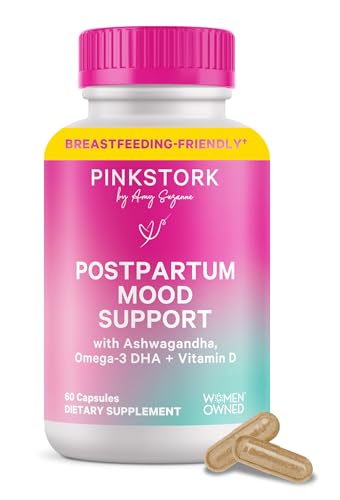After childbirth, it’s normal to experience a range of emotions, from happiness to sadness, due to hormonal shifts and sleep deprivation. You might feel overwhelmed, anxious, or disconnected initially, but these feelings often improve with time and support. Bonding with your baby may take patience, and mood swings are common. If your emotions persist or worsen, seeking help is important. Keep exploring to understand more about what’s typical and how to navigate these feelings confidently.
Key Takeaways
- Hormonal fluctuations after childbirth cause temporary mood swings, sadness, or anxiety.
- Initial bonding feelings may be delayed, and emotional adjustment takes time.
- Sleep deprivation often worsens feelings of overwhelm, irritability, and emotional instability.
- Mood can vary from energized to irritable or sad, reflecting normal hormonal changes.
- Seek support if feelings persist beyond a few weeks or deepen, indicating possible postpartum depression.

After giving birth, many women experience a whirlwind of emotions that can be both overwhelming and confusing. These postpartum emotions are completely normal and often reflect the body’s response to rapid hormonal shifts happening after delivery. Your hormones, which soared during pregnancy, suddenly plummet, causing mood swings, irritability, and feelings of sadness or anxiety. This hormonal rollercoaster can make it hard to feel emotionally steady, and you might find yourself swinging between joy and despair without warning. It’s important to recognize that these intense feelings typically don’t last forever, but they can feel all-consuming during the early days and weeks postpartum.
Bonding challenges are also common during this period. You may expect to feel an immediate, deep connection with your baby, but instead, you might experience feelings of distance, confusion, or even frustration. This doesn’t mean you don’t love your child; it’s simply part of the adjustment process. Your body and mind are working hard to adapt to this new role, and sometimes that takes time. You might find yourself questioning your ability to care for your newborn or feeling overwhelmed by the responsibilities. These feelings can be intensified by sleep deprivation, which affects your emotional resilience and makes bonding even more challenging at times. Remember, bonding is a process that develops gradually, and giving yourself patience and grace is crucial.
You might also notice fluctuations in your mood that aren’t necessarily linked to your interactions with your baby. Some days, you’ll feel energized and optimistic, while on others, you might sink into feelings of sadness or irritability. These variations are part of postpartum emotional responses and often tied to hormonal shifts. Recognizing that these feelings are temporary can help you manage them better. It’s essential to seek support from loved ones, healthcare providers, or support groups if your emotions become overwhelming or persist beyond a few weeks. Many women experience postpartum blues, a mild, temporary sadness that can be managed with time and support, but if feelings deepen or last longer, it could be postpartum depression, which warrants professional help. Understanding hormonal shifts can also empower you to better navigate these emotional changes.

Pink Stork Postpartum Mood Support – Postnatal Hormone Balance for Women – Breastfeeding Friendly – Stress & Cognitive Support, New Mom Essentials – Ashwagandha, Chamomile, & Vitamin D, 60 Capsules
Pink Stork Postpartum Wellness Support is carefully formulated to support your body's natural postpartum rhythm and promote emotional…
As an affiliate, we earn on qualifying purchases.
As an affiliate, we earn on qualifying purchases.
Frequently Asked Questions
How Long Do Postpartum Emotions Typically Last?
Postpartum emotions typically last for a few weeks to a couple of months after birth. During this time, hormonal fluctuations and sleep deprivation considerably impact your mood, causing feelings of sadness, anxiety, or overwhelm. You might notice improvement as your hormones stabilize and you get more rest. However, if these emotions persist beyond this period or worsen, it’s important to seek support, as it may indicate postpartum depression.
When Should I Seek Professional Help for Postpartum Feelings?
You should seek professional help if your postpartum feelings, like postpartum anxiety or signs of postpartum depression, last more than two weeks or worsen. If you’re experiencing intense sadness, hopelessness, difficulty bonding with your baby, or thoughts of harming yourself or your baby, reach out immediately. Don’t ignore persistent or severe symptoms; a mental health expert can provide support and treatment to help you recover and feel better.
Can Postpartum Emotions Affect My Relationship With My Partner?
Postpartum emotions can definitely affect your relationship with your partner. You might find it harder to communicate openly or feel emotionally distant, which impacts intimacy. To strengthen your bond, prioritize partner communication and share your feelings honestly. Remember, these changes are common, but if emotional distance persists or worsens, consider seeking professional help. Supporting each other through understanding and patience can help maintain emotional intimacy during this challenging time.
Are Postpartum Emotions Different for First-Time Mothers?
Did you know that about 75% of first-time mothers experience postpartum emotional changes? As a first-time mom, your postpartum emotions might feel more intense or unpredictable due to new motherhood challenges. These emotional shifts are common, but they can differ from mothers who’ve had previous children. You might find yourself more overwhelmed or anxious, but remember, your feelings are normal, and support can help you navigate this transformative time confidently.
What Self-Care Strategies Can Help Manage Postpartum Emotions?
You can manage postpartum emotions by practicing mindfulness techniques, which help you stay present and reduce stress. Prioritize sleep hygiene by establishing a calming bedtime routine and avoiding screens before sleep. Take short breaks when needed, ask for support, and breathe deeply during overwhelming moments. These strategies empower you to nurture your mental health and create a healthier postpartum experience for both you and your baby.

Sleep Aid for New Moms
As an affiliate, we earn on qualifying purchases.
As an affiliate, we earn on qualifying purchases.
Conclusion
Think of your postpartum journey as sailing through unpredictable waters. Some days, the sea is calm, and others, waves crash fiercely. Remember, it’s okay to feel tossed around — you’re steering a new landscape of emotions. Trust your compass, lean on your crew, and know that, with time, you’ll find steady shores again. Embrace each wave as part of your voyage, and soon, you’ll anchor in a harbor of peace and strength.

The Compassionate Mind Approach To Postnatal Depression: Using Compassion Focused Therapy to Enhance Mood, Confidence and Bonding
As an affiliate, we earn on qualifying purchases.
As an affiliate, we earn on qualifying purchases.

Dr. Talbot's Mom Perineal Soothing Foam – Cooling Postpartum Relief with Witch Hazel and Citroganix – Postpartum Essentials – 5 fl oz
POSTPARTUM PERINEAL FOAM FOR MOM: Dr. Talbot's Mom Perineal Soothing Foam is formulated with mom in mind; Helps…
As an affiliate, we earn on qualifying purchases.
As an affiliate, we earn on qualifying purchases.









